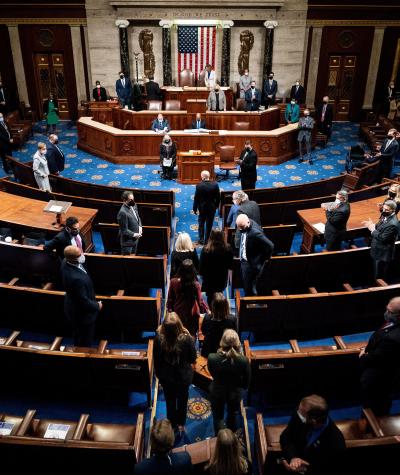The U.S. Senate Committee on Rules and Administration held a hearing on the urgent need to update the Electoral Count Act (ECA), an outdated law from 1887 that outlines procedures for casting and counting Electoral College votes in presidential elections.
This hearing follows last month’s introduction of bipartisan legislation – the Electoral Count Reform Act of 2022 (ECRA) – that would modernize the ECA and help prevent attempts to sabotage the results of presidential elections.
When Americans cast their votes for president and vice president, they do so indirectly by voting for their state’s slate of electors. Electors in each state then meet after Election Day to cast their votes in the Electoral College, and those votes are sent to Congress, which counts them to confirm the winner.
For more than a century, the ECA has set a timeline for selecting electors and transmitting their votes to Congress. The ECA also establishes procedures for how Congress counts the electoral votes and the role of the vice president, who presides over this process under the 12th Amendment as the president of the Senate.
However, the ECA has not been updated since it was first enacted more than 130 years ago, and it is rife with imprecise language, gaps and ambiguities that partisan actors attempted to exploit as part of an organized effort to overturn the 2020 election. Although this plan failed, the obscure language of the ECA remains ripe for manipulation.
That’s why the introduction of the ECRA and the Senate’s recent hearing are so important. They represent a strong, bipartisan effort to address the ECA’s most serious vulnerabilities and help ensure that our elections are decided by voters.
The Senate Rules Committee hearing featured testimony from bipartisan lawmakers who sponsored the ECRA, as well as constitutional experts, academic scholars, election law advocates and officials from prior administrations representing all political viewpoints.
Every one of these witnesses agreed that the ECA needs an urgent update. In addition, they agreed that at least four key changes must be made to the law:
- Prohibiting state legislatures from changing the law after Election Day to overrule their voters and the results of the popular election.
- Providing a timeline and mechanism to resolve disputes about electors and election certifications in the courts before those disputes reach Congress.
- Strictly limiting opportunities for members of Congress to second-guess states’ election results by raising the numerical threshold for lawmakers to object to electors or electoral votes.
- Clarifying the vice president’s ministerial role in the counting of electoral votes and reinforcing that the vice president does not decide election results.
Campaign Legal Center (CLC) believes that the ECRA would significantly improve the ECA to reduce opportunities for election sabotage in all four of these key areas.
Like the Senate Rules Committee’s witnesses, CLC commends the strong, bipartisan effort to draft this legislation and encourages additional bipartisan consideration of technical amendments to further clarify its provisions.
Many of the experts also testified about other issues Congress must address to protect our freedom to vote. To create a democracy that works for all Americans, only updating the ECA is not enough. In addition, we need state and federal policies that uniformly protect the right to vote, promote trust in our elections and boost voter participation across the United States.
Modernizing the ECA is nevertheless a step in the right direction that will provide critical safeguards for the results of presidential elections. If perfected and passed, the ECRA would help prevent the events of 2020 from happening again. The hearing made clear that there is widespread, bipartisan support for moving the ECRA forward as soon as possible.
A poll commissioned by CLC, Protect Democracy, Issue One and RepresentUS showed strong, bipartisan support among voters for updating the ECA. It also highlighted the serious concern held by a majority of voters (58%) that one party in Congress could try to overturn the results of an upcoming presidential election to put their own candidate in power.
Since the next presidential election could be one of the most contentious ever, the time to update the Electoral Count Act is now. Following the Senate’s hearing, members of Congress must come together and pass the strongest possible update to the ECA without delay. Our democracy depends on it.

